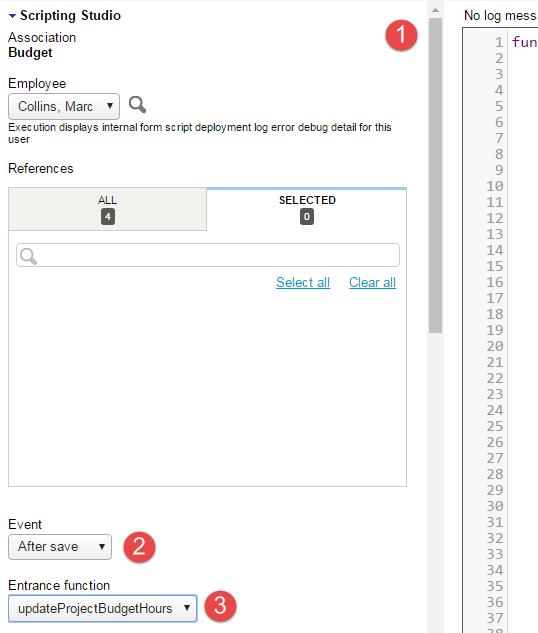Control budgeted hours for a project using the transactional budget feature and a custom hours field
This script controls the budgeted hours for a project using the transactional budget feature and a custom hours field.
Requires "Transactional budgets" feature enabled. For more information about the transactional budget feature, see Transactional Budget.
-
Only requires you to manage your budgeted hours in one place
-
Allows budgeted hours to be date stamped for better change order management
-
Form permissions can be used to make the transactional budget hours field read only, which matches the budget money field behavior
Follow the steps below or download the solutions file, see Creating Solutions for details.
Setup
-
Create a new Transactional budget form script deployment.
-
Enter a Filename and click SAVE. The extension '.js' is automatically appended if not supplied.
-
Click on the script link to launch the Scripting Studio.
-
(1) Copy the Program Listing below into the editor, (2) set the After save event, and set updateTransactionalBudgetHours as the Entrance Function.

-
Set up an Hours custom field for Project and an Hours custom field for Budget.

Program Listing
function updateTransactionalBudgetHours(type) {
try {
// DEBUG: Remove the comment marks for next line to enable XML logging
// var wsLog = NSOA.wsapi.enableLog(true);
// list all fields used in script
var FLD_PRJ_ID = 'id',
FLD_PRJ_BUD_HRS = 'prj_budget_time__c',
FLD_BUD_PID = 'projectid';
// store newly saved budget record
var updBudget = NSOA.form.getNewRecord();
// create new budget object to store information
var budRec = new NSOA.record.oaBudget();
budRec.projectid = updBudget.projectid;
var budRequest = {
type: "Budget",
method: "equal to",
fields: "id,budget_hours__c", // budget_hours__c is a custom hours field
attributes: [{
name: "limit",
value: "100"
}],
objects: [budRec]
};
// disable the current user's filter set while script runs
NSOA.wsapi.disableFilterSet(true);
// search for all budget transactions with current projectid
var budResults = NSOA.wsapi.read(budRequest);
if (!budResults || !budResults[0]) {
NSOA.meta.log('error', 'Unexpected error! Could not return transactional budgets.');
return;
} else if (budResults[0].errors !== null && budResults[0].errors.length > 0) {
prjResults[0].errors.forEach(function(err) {
var fullError = err.code + ' - ' + err.comment + ' ' + err.text;
NSOA.meta.log('error', 'Error: ' + fullError);
});
return;
}
var b,
totalBudHrs = 0,
budObj = budResults[0].objects,
budObjLen = budObj.length;
for (b = 0; b < budObjLen; b++) {
var budHrs = parseInt(budObj[b].budget_hours__c, 10);
totalBudHrs += budHrs; // add all hours together
}
// create new project object to store information
var prjRec = new NSOA.record.oaProject();
prjRec[FLD_PRJ_ID] = updBudget[FLD_BUD_PID];
prjRec[FLD_PRJ_BUD_HRS] = totalBudHrs;
// disable the current user's filter set while script runs
NSOA.wsapi.disableFilterSet(true);
// update the transactional budget
var prjResults = NSOA.wsapi.modify(
[{
name: "update_custom",
value: "1"
}], [prjRec]
);
if (!prjResults || !prjResults[0]) {
NSOA.meta.log('error', 'Unexpected error! Project was not updated.');
} else if (prjResults[0].errors !== null && prjResults[0].errors.length > 0) {
prjResults[0].errors.forEach(function(err) {
var fullError = err.code + ' - ' + err.comment + ' ' + err.text;
NSOA.meta.log('error', 'Error: ' + fullError);
});
return;
}
} catch (e) {
NSOA.meta.log('error', 'Try/catch error: ' + e);
}
}